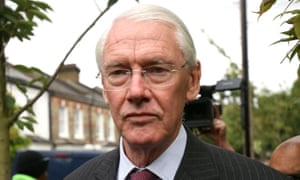
Sir Martin Moore-Bick is ‘scrupulously fair, pleasant and even-handed’, according to colleagues.
Photograph: Philip Toscano/PA
Grenfell Tower fire
Sir Martin Moore-Bick’s contract law experience will be asset to Grenfell inquiry
Former vice-president of court of appeal will need to be resilient in face of media scrutiny of his past judgments
Sir Martin Moore-Bick may not be high profile outside legal circles but his expertise in arcane commercial contracts could prove highly relevant to the Grenfell Tower inquiry.
Required to retire at the age of 70 last December, Moore-Bick ended his judicial career in England and Wales as vice-president of the civil division of the court of appeal. He has since served on Gibraltar’s court of appeal.
Most of his appeal court cases involved technical judgments, in shipping and transport, rather than headline-grabbing claims against the government over alleged breaches of human rights.
His knowledge of contract law should be useful in the inquiry’s investigation into the overlapping layers of responsibility that accumulated around the Grenfell Tower renovations. Police have revealed that 60 firms were involved in the refurbishment.
Moore-Bick was chosen by the lord chief justice, Lord Thomas of Cwmgiedd, to chair the inquiry. His nomination was accepted by Downing Street, which praised him as being “highly respected [and] hugely experienced”.
Media attention focused quickly on one controversial case that he presided over; in 2014 he, with two other judges, ruled that Westminster council could rehouse Titina Nzolameso, a single mother with five children, more than 50 miles away in Milton Keynes.
Westminster did not need to explain in detail what other accommodation was available, Moore-Bick concluded, adding that it could take “a broad range of factors” into account, including the pressures on the council in deciding what housing was available.
The following year the supreme court reversed his judgment, pointing out that the council had not asked “any questions aimed at assessing how practicable it would be for the family to move out of the area”.
Lawyers who know Moore-Bick, however, rallied to his defence. James Turner QC tweeted: “What is all this utter nonsense about Sir Martin Moore-Bick being ‘controversial’? He’s actually scrupulously fair, pleasant and even-handed.”
Other cases show more appreciation of his decision-making. He was praised by civil liberties lawyers when he criticised the police for retaining information notices on suspects for too long. He was lauded by the justice minister, Dominic Raab, for applying “long-awaited common sense” to limit human rights law in a case where he deported a foreign-born criminal whose young children lived in Britain.
Moore-Bick may now be subjected to the kind of press scrutiny that beset chairs of the national child abuse inquiry, which is now on its fourth chair after a succession of controversial appointments. His resilience will certainly be put to the test.
Lord Falconer, a former justice secretary who worked with him, said he was “a good choice” but he would face a challenging task. “He will need to gain the respect and trust of the residents,” Falconer told BBC Radio. “He must be immune to pressures put upon him.
“He will have to do a good job and a good job quickly. Sir Martin Moore-Bick has the ability, the capacity and the personal qualities to do that.”
A former colleague on the court of appeal paid tribute to his abilities: “He’s very clear thinking, hard working, careful and conventional. He’s absolutely straight down the line: the type who wins the egg and spoon race. He won’t drop the egg.”
Moore-Bick, he said, was appointed when relatively young. “He doesn’t come from a poor background … He’s not revolutionary, but you probably don’t want that.
“He was very good as a commercial judge where you had vast amounts of paper and lots of different issues and people involved. He was very good at cutting through and organising that. He won’t be quite as good at hugging people.”
Moore-Bick’s double-barrelled name and Cambridge education may suggest that he is a classic establishment figure, but he attended a grammar school in Kent rather than Eton or Winchester.
His entry in Who’s Who lists his interests as early music, gardening, and reading. He is keen on roses and choral music. His younger brother was a major general.
The Labour MP David Lammy, who lost a friend in the fire, said the judge would need to overcome widespread suspicion. “The victims of Grenfell Tower, their families and the survivors will need Sir Martin Moore-Bick’s independence and impartiality during the course of this public inquiry,” he wrote in the Guardian.
“They will need his experience and his judicial mind, but above all else they will need his empathy.
“I sincerely doubt that Sir Martin Moore-Bick has ever visited one of our inner city tower blocks, but I hope that he will do so soon. I doubt that he has lived in social housing or spent a night in a flat in a high rise building, but he will now have to stand in the shoes of the people who called Grenfell home, he will have to empathise with their experiences and he will have to walk alongside them and their families.”